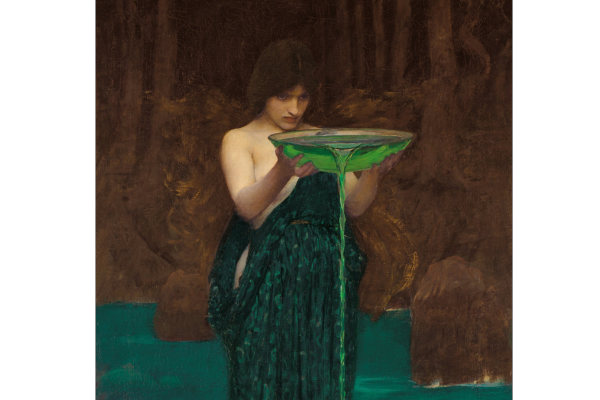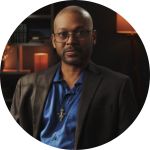Excerpt taken from the Postscript of On Teaching Fairy Stories by Junius Johnson, ©2023 coming soon. Used by permission of ClassicalU Books, an imprint of Classical Academic Press.
An old name for Fairyland is the Realm Perilous. The poetry of that name alone makes it a suitable descriptor for Fairyland, but its suitability is not exhausted in the poetry. It is also suitable because the fairy realm is a land of dangers. It is inherently a land of dangers: you could no more have a Fairyland without danger than you could have a universe without energy. But why it should be so is instructive.
Fairyland is, most fundamentally, a mirror held up to the world we live in. Its purpose is to show the world to us truly. But in order to be able to show the world truly, it cannot show the world as it is, because the world hides its truth under a false appearance. This is why fairy stories are so obsessed with the notion of appearance and reality, with spells and enchantments that warp reality to appear different than it is, and magical shields that reveal its truth.[1] This is all just Fairyland being honest, showing you the work it has to do to bring the world to you clearly.
Our understanding of the world around us has been twisted into the grotesque. In our neverending struggle to be like God in a competitive sense, we try to wrest the creation that was intended for its Creator away from him and make it about us. This continual remaking of the world in our own image is a failed project, but it is not without its fruit: we do not succeed in turning it from its orientation to God, but we do succeed in creating a filter through which to see the world that distorts it more to our liking. We are all like Uncle Andrew in The Magician’s Nephew: “The trouble with trying to make yourself stupider than you really are is that you very often succeed. Uncle Andrew did. He soon did hear nothing but roaring in Aslan’s song. Soon, he couldn’t have heard anything else even if he had wanted to.”[2] That is what we are all like. So if Fairyland is going to hold up a mirror to the world, it will have to be a funhouse mirror, making the world plain by its very distortion. The fault lies not in Fairyland, but in our eyes, which can no longer see straight.
Fairy stories, as Chesterton tells us, “say that apples were golden only to refresh the forgotten moment when we found that they were green. They make rivers run with wine only to make us remember, for one wild moment, that they run with water.”[3]
Fairyland performs an inversion on our world, rendering it topsy-turvy so that a race that has become turned upon itself can see it rightly.
“Every human who has been here has learned something that could be learned only here, and returned to his own world a changed person. Because he had seen you creatures in your true form, he was able to see his own world and his fellow humans with new eyes. Where he had seen only dull, everyday reality, he now discovered wonders and mysteries.”[4] An important corollary of this is that everything that is true of Fairyland is true of our world; it is true of Fairyland because it is true of our world.
What has this got to do with peril? I have already mentioned that the dangers of Fairyland are but the reflections of the brokenness of our world; but this is not the most relevant of the perils. Rather, the perils of Fairyland are spiritual in nature. By spiritual I do not mean spiritual beings, as if Fairyland were the Realm Perilous because you might encounter demons there. No, I mean that the danger we encounter there is a danger that sets our very souls at play.
Fairyland is dangerous in the same way that Aslan is not safe. “Who said anything about safe? ‘Course he isn’t safe. But he’s good. He’s the King, I tell you.”[5] How can Aslan not be safe if he is good? Only if we to whom he comes are not good. Because the good has no opposite, it is the first thing, the Reality of realities; evil is its poor shadow. And so the good will not be deterred, turned aside, or thwarted, however much evil may nip at its heels. To encounter the good is to rejoice if you are, yourself, good; but what if you are not? Because if you are not, once you stand before it, all pretensions that you are good must fall away. “I felt sure that the creature was what we call ‘good,’ but I wasn’t sure whether I liked ‘goodness’ so much as I had supposed. This is a very terrible experience. As long as what you are afraid of is something evil, you may still hope that the good may come to your rescue. But suppose you struggle through to the good and find that it also is dreadful? How if food itself turns out to be the very thing you can’t eat, and home the very place you can’t live, and your very comforter the person who makes you uncomfortable? Then, indeed, there is no rescue possible: the last card has been played.”[6] And this is played out throughout the Narnia books: the encounter with Aslan is delightful just to the extent that your heart delights in him above all things, which is what it means to be good. But to the extent that you are seeking your own way, or seeking to justify your behavior, or have not been a good friend or a faithful companion, you find him severe and exacting.
Fairyland is perilous in a similar way, for it is out to reveal the kind of person you are. But since you are still in progress, no mere examination of your quality will do: you must be tested: presented with a choice and placed under a prohibition. “The vision always hangs upon a veto. All the dizzy and colossal things conceded depend upon one small thing withheld.” “You may live in a palace of gold and sapphire, if you do not say the word ‘cow’; or You may live happily with the King’s daughter, if you do not show her an onion.”[7] Well, what will you choose? Can you forego to do or say or have something trivial because you’ve been commanded not to? Or do you remain a rebel at heart? The hero invariably says the word cow, or shows the princess an onion, and immediately, with the absolute necessity and inescapability of magic, he is plunged into a darkness from which he will only escape with great difficulty and after many trials. Our hearts break because it was such a small condition: how could he have traded bliss for such a trivial thing? Ought not the king’s daughter to have been prized above any amount of produce?
But Fairyland is always talking about you, is always showing you yourself.
As you read the stories and let yourself get drawn deeper into them, you feel that you, too, are not safe.
Bastian had this experience as he read The Neverending Story: “Bastian gave a start when he realized what he had just read. Why, that was him! The description was right in every detail. The book trembled in his hands. This was going too far. How could there be something in a book that applied to this particular moment and only to him?”[8] Eventually, the book that Bastian is reading turns up as a book in the story, and Bastian hears his own story, from the very prologue, read aloud to him. “Why, this was all about him! And it was the Neverending Story. He, Bastian, was a character in the book which until now he had thought he was reading.”[9] Everything that took place in that book, all of Atreyu’s wanderings, were to bring Bastian to this point. “Do you understand now, Atreyu,” the Childlike Empress asks, “why I had to ask so much of you? Only a long story full of adventures, marvels, and dangers could bring our savior to me. And that was your story.”[10] But the story will not let you miss the point; the very next words after Bastian realizes the book is about him turn the tables on you, who are also sitting in relative obscurity reading (or thinking you are only reading) a book called The Neverending Story: “And heaven only knew who else might be reading it at the exact same time, also supposing himself to be just a reader.”
Fairyland aims at this breaking down of the distance between the story and the reader. What The Neverending Story does literally, every other fairy story does in a less overt way, and it is all to convey one extremely dangerous idea: The hero is a fool because you are a fool; he exchanges joy for sorrow because you do the same every day in a thousand different ways. The hero is in danger because you are in danger, and you need to have that danger revealed to you. Fairyland is the Realm Perilous because it will tell you the truth about yourself. And nothing is more dangerous than that.
[1] Edmund Spenser, The Fairie Queene (London: Penguin, 1978), Book I, canto VII, stanza 35: “No magicke arts hereof had any might, / Nor bloudie wordes of bold Enchaunters call, / But all that was not such, as seemd in sight, / Before that shield did fade, and suddeine fall.”
[2] The Magician’s Nephew, p. 137.
[3] “The Ethics of Elfland,” p. 51.
[4] Michael Ende, The Neverending Story, trans. Ralph Manheim (New York: Firebird, 2005), p. 176.
[5] The Lion, the Witch, and the Wardrobe, p. 80.
[6] C. S. Lewis, Perelandra (New York: Scribner, 2003), p. 17
[7] “The Ethics of Elfland,” pp. 52-3. I have inverted the order of the text for clarity.
[8] The Neverending Story, p. 106.
[9] ibid., pp. 196-7.
[10] ibid., p. 177.


